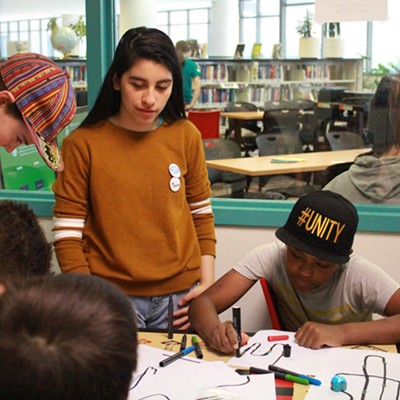So, what's the antidote? It may be as simple as old-fashioned dialogue and communication between parents, teens and the community.
There are certainly justifiable reasons for a teen to leave a home; if safety or abuse is ever at issue, a young person needs to have a trusted adult to talk to and a safe space to take refuge. Too many times, kids stay in unsafe situations to protect a parent or to avoid going into the system; sometimes, they simply believe that things will get better with time.
But let's be frank: There is also a group of young people who decide that the rules of the house are simply too much for them to abide by. As early as 12 and 13, these kids deem their friends as all-knowing and the adults in their lives as troublesome.
Each year, thousands of teens leave the place they know as home in search of a new home. Teens run to different places for different reasons. Many choose large East Coast cities like New York City, hoping to blend in; others opt for warmer weather and head west to California to tap into the underground network of homeless peers finding their way on their own--often a rough and unpleasant journey.
Basic math and some research make Tucson a viable short-term stop on the runaway circuit. Tucson has a plethora of low-paying menial jobs into which the unskilled can slip.
I've held a working master's degree in guidance and counseling for almost 20 years. The bulk of my professional career has been spent working with youth and young adults in human-service organizations and on a grassroots level.
I hope that adults, with some tough-love strategies and tools, can come into young lives and offer some guidance and hope for the future. It is of utmost importance that we talk to today's youth to find out who they are and what they feel. They, as well as we, live in some very uncertain times.
Many youths in the system are viewed by some as throwaway kids, for a variety of reasons. Labels like "low achiever" and "troublemaker" do a lot to mark a young person. Once these kids are labeled, it takes a lot for those preconceived views to be removed. I spent a year and a half as a program director running a street-outreach program and drop-in center for lesbian, gay, bisexual and transgender youth. The Ruth Ellis Center, in Highland Park, Mich., certainly provided me with numerous opportunities to help and mentor. There was a strong need to find a positive resolution for kids who were homeless and/or kicked out onto the street.
Tucson is a stopover for runaways heading west; locals with hearts, please take note and prepare. You may have what it takes to be surrogate parent and get a young person back on track.
As for parents, many of them are reluctant to "be real" with the issues, so kids do what is easiest: They turn to ill-equipped friends who believe they have all the answers. There is a fine line between being open enough to talk to your kids honestly and trying to be their best friend. Parenting is hard work, and with teens, it can sometimes seem impossible, because what has worked for previous generations of parents simply won't do with the current generation.
Possible solutions include real, honest communication; setting goals together with reasonable timeframes; allowing young people to make mistakes; making sure they understand that poor choices lead to poor consequences; and letting teens learn life lessons so they discover how to stand on their own two feet.
But most importantly, we need to let them know--on an ongoing basis--that they are loved and cared about, and that they do indeed matter. We have to give them a platform and listen; that's where compromise comes in. We all want respect, and it's earned on both sides.








